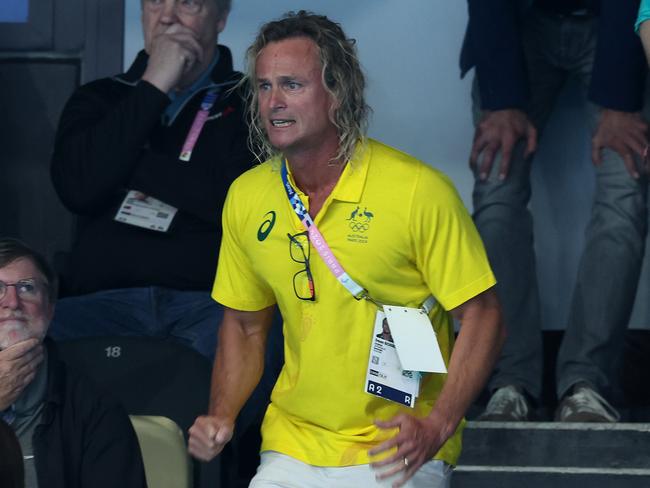Mollie O’Callaghan v Ariarne Titmus rivalry: Inside swimming’s most complicated relationship
They’re two of the fastest swimmers in the world and they train in the same pool. Ariarne Titmus and Mollie O’Callaghan open up on their relationship, and how Dean Boxall is central to their success.

Training his daughters to be tennis champions, Richard Williams long dreamt of the day when Serena and Venus would play each other in the Wimbledon final.
But when it eventually happened, “King Richard” was nowhere to be seen near the famous grass Centre Court, because he couldn’t bear to see one of them lose.
Charismatic Australian swim coach Dean Boxall faced the same heartbreaking dilemma at the Paris Olympics when Ariarne Titmus and Mollie O’Callaghan squared off in the women’s 200m freestyle. The fastest women in the event’s history, O’Callaghan swam down Titmus to claim her first invidual Olympic gold medal.
It continued a seesawing rivalry between the pair, who earlier finished one-two in the semis, in Paris, with Arnie just touching her out. And therein lies the intrigue. O’Callaghan beat Titmus at last year’s world titles in Japan, setting the world record in the process, but the Terminator turned the tables at last month’s Australian Olympics trials when both women went quicker than the old world record.

Although they are friends outside of the pool, they’re both fiercely competitive when they race each other and with Olympic gold on offer, the stakes could not be higher.
A natural chatterbox who is normally happy to answer questions on anything from the Chinese doping scandal to her choice of nail polish, Titmus was noticeably tense whenever she was quizzed about her rivalry with O’Callaghan.
“To be honest, we don’t train together. She does a very different program to me. She does the sprint program. I do the distance program, so we hardly ever cross paths,” Titmus said at the Australian team’s training base in Chartres, south west of Paris.
“It’s just as if I was racing anyone else on the team really, so I think that’s good. Dean does a really good job of managing that.
“I don’t look at any of my competitors as competitors outside of the water. I try to look at them as the person they are and that makes it easy to really keep things civil.”
Because O’Callaghan and Titmus train together in the same pool almost every day, they get to see first-hand what the other one is doing and have learned to take all the emotion out of it and go about their work as if it’s business as usual.
“The key part is balance,” O’Callaghan said. “From time to time we’ll race each other, and from time to time we won’t. The main part is having that healthy relationship with the girls.
“We are competitors at the end of the day, but also having that friendship outside of the water.
“From time to time we might get mad at each other or we might be nice to each other, so it kind of balances training out. Shayna (Jack) and I are probably racing each other a bit more.
“She’s sprint group, I’m middle distance and then Arnie’s distance so we’re quite all spread out throughout the session and then we join up from time to time.
“Obviously, you get mad at people during a set. We don’t really fight but it’s more the aspect that we hang around each other so much and practically like sisters.
“You kind of are around them so much that they just become family.”

Like a doting dad, Boxall doesn’t play favourites but has to walk a fine line because part of his job is to give both women the best advice on how to beat the other, though he won’t ever divulge what he privately tells them.
“Dean just has a really good, emotional intelligence skill, which is to understand each person,” Australian head coach Rohan Taylor said.
“He calls it a key. He has the key to each person, and he spends the time with them, equal amounts of time and works on them.” He deals with each swimmer in “very different ways and he’s very good at doing that. He doesn’t do it in one fashion”.
“That’s the art of what Dean Boxall brings. He was under Michael Bohl and Michael Bohl is a genius at it as well,” he said.
“Their ability to manage their athletes is exceptional and how they work with them in and out of the water.
“That’s the delicate balance. At the end of the day, they’re both significantly competitive so they’re going to want to be the best so it’s about allowing that to be there, but obviously being fair across both.”







To join the conversation, please log in. Don't have an account? Register
Join the conversation, you are commenting as Logout